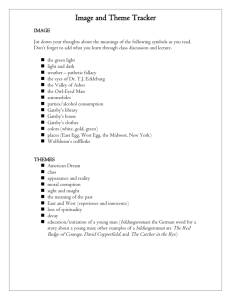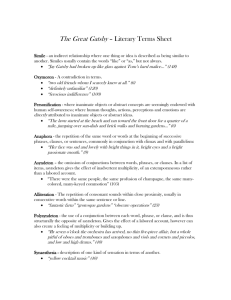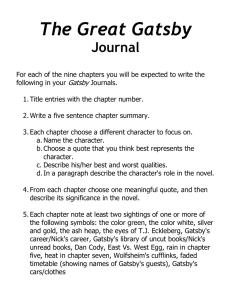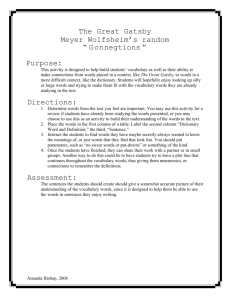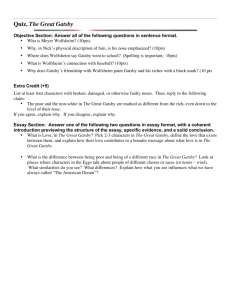Essay Assignment
advertisement
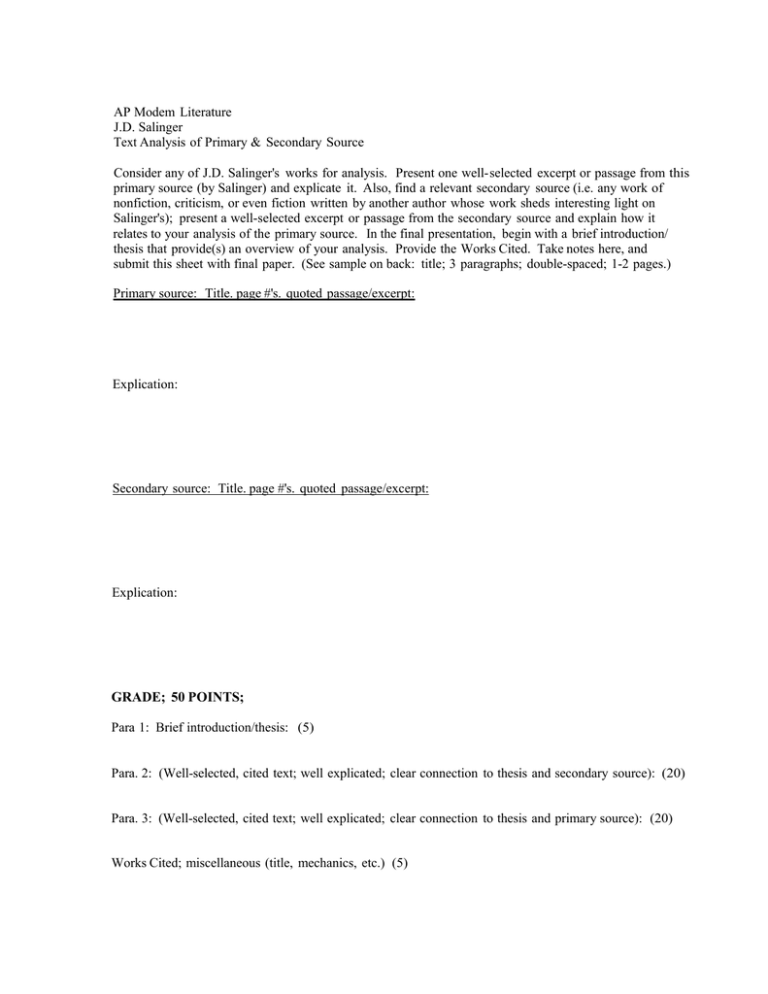
AP Modem Literature J.D. Salinger Text Analysis of Primary & Secondary Source Consider any of J.D. Salinger's works for analysis. Present one well-selected excerpt or passage from this primary source (by Salinger) and explicate it. Also, find a relevant secondary source (i.e. any work of nonfiction, criticism, or even fiction written by another author whose work sheds interesting light on Salinger's); present a well-selected excerpt or passage from the secondary source and explain how it relates to your analysis of the primary source. In the final presentation, begin with a brief introduction/ thesis that provide(s) an overview of your analysis. Provide the Works Cited. Take notes here, and submit this sheet with final paper. (See sample on back: title; 3 paragraphs; double-spaced; 1-2 pages.) Primary source: Title. page #'s. quoted passage/excerpt: Explication: Secondary source: Title. page #'s. quoted passage/excerpt: Explication: GRADE; 50 POINTS; Para 1: Brief introduction/thesis: (5) Para. 2: (Well-selected, cited text; well explicated; clear connection to thesis and secondary source): (20) Para. 3: (Well-selected, cited text; well explicated; clear connection to thesis and primary source): (20) Works Cited; miscellaneous (title, mechanics, etc.) (5) AP Modern Lit Sample Paper (on The Great Gatsby, not Salinger) Joe Student Mr. Wolfsheim's Sinister American Corruption One minor character in one minor scene in The Great Gatsby captures the essence of corruption in America. Meyer Wolfsheim is portrayed as a heartless, reckless, almost comical exaggeration of corrupted power, but what marks him as especially sinister, ironically, is his intelligence, creativity, and generosity— trademark American values. It is in this complicated and contradictory man that Fitzgerald represents both a dark and celebrated American idea: that effort and talent yields success at any cost, regardless of morality. When Nick asks Gatsby who Wolfsheim really is, disturbed by the man's lies and sinister humanmolar cufflinks, Gatsby explains, with gleeful enthusiasm, “he's a gambler.... He's the man who fixed the World's Series back in 1919” (78). When Nick questions how Wolfsheim did this and why he's not in jail, Gatsby plainly and logically explains Wolfsheim's greatest qualities—the secrets to his success: “He just saw the opportunity.... He's a smart man.” Indeed, Fitzgerald captures in Wolfsheim a most despicable, yet wonderfully ironic, combination of characteristics celebrated in American culture—and this man has used his skills to literally sabotage baseball, the Great American Pastime. In “The Road to West Egg” Christopher Hitchens calls the likes of Wolfsheim “Jazz Age narcissists” (80), who in the year “1919 did see a genuine loss of innocence and a serious, if hopeless, attempt to regain it.... The rigging of the World Series really did come as a blow, innocence not so much lost as stolen or defiled.... Disillusionment was setting in, and the boys from ‘over there’ had brought back some racy and cynical new ideas.” He adds, “you get the sensation, from The Great Gatsby, that the 20th century is not going to be a feast of reason and a flow of soul” (86). Indeed, disillusionment is fully realized in the novel, captured in a cynicism so well developed that Gatsby himself hails Wolfsheim 's achievements, along with his “qualities” (opportunistic and intelligent) without the slightest degree of discomfort—to the contrary, Gatsby is full of admiration for Wolfsheim, who in Jay's eyes embodies the great American “success” story— morals be damned. Works Cited Fitzgerald, F. Scott. The Great Gatsby. New York: Collier Books, 1925. Hitchens, Christopher. "The Road to West Egg." Vanity Fair. May 2000: 76-86.
